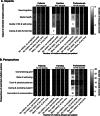Restricted visitation policies in acute care settings during the COVID-19 pandemic: a scoping review
- PMID: 34563234
- PMCID: PMC8465762
- DOI: 10.1186/s13054-021-03763-7
Restricted visitation policies in acute care settings during the COVID-19 pandemic: a scoping review
Abstract
Background: Restricted visitation policies in acute care settings because of the COVID-19 pandemic have negative consequences. The objective of this scoping review is to identify impacts of restricted visitation policies in acute care settings, and describe perspectives and mitigation approaches among patients, families, and healthcare professionals.
Methods: We searched Medline, Embase, PsycINFO, Healthstar, CINAHL, Cochrane Central Register of Controlled Trials on January 01/2021, unrestricted, for published primary research records reporting any study design. We included secondary (e.g., reviews) and non-research records (e.g., commentaries), and performed manual searches in web-based resources. We excluded records that did not report primary data. Two reviewers independently abstracted data in duplicate.
Results: Of 7810 citations, we included 155 records. Sixty-six records (43%) were primary research; 29 (44%) case reports or case series, and 26 (39%) cohort studies; 21 (14%) were literature reviews and 8 (5%) were expert recommendations; 54 (35%) were commentary, editorial, or opinion pieces. Restricted visitation policies impacted coping and daily function (n = 31, 20%) and mental health outcomes (n = 29, 19%) of patients, families, and healthcare professionals. Participants described a need for coping and support (n = 107, 69%), connection and communication (n = 107, 69%), and awareness of state of well-being (n = 101, 65%). Eighty-seven approaches to mitigate impact of restricted visitation were identified, targeting families (n = 61, 70%), patients (n = 51, 59%), and healthcare professionals (n = 40, 46%).
Conclusions: Patients, families, and healthcare professionals were impacted by restricted visitation polices in acute care settings during COVID-19. The consequences of this approach on patients and families are understudied and warrant evaluation of approaches to mitigate their impact. Future pandemic policy development should include the perspectives of patients, families, and healthcare professionals.
Trial registration: The review was registered on PROSPERO (CRD42020221662) and a protocol peer-reviewed prior to data extraction.
Keywords: Acute care; COVID-19; Family presence; Hospital Policy; Visitors.
© 2021. The Author(s).
Conflict of interest statement
The authors declare that they have no competing interests.
Figures


References
-
- Rosa RG, Falavigna M, da Silva DB, Sganzerla D, Santos MMS, Kochhann R, de Moura RM, Eugenio CS, Haack T, Barbosa MG, et al. Effect of flexible family visitation on delirium among patients in the intensive care unit: the ICU visits randomized clinical trial. JAMA. 2019;322(3):216–228. doi: 10.1001/jama.2019.8766. - DOI - PMC - PubMed
Publication types
MeSH terms
Grants and funding
LinkOut - more resources
Full Text Sources
Medical

